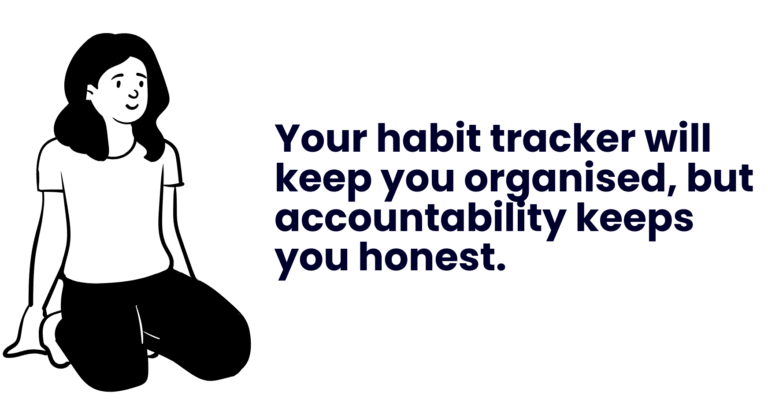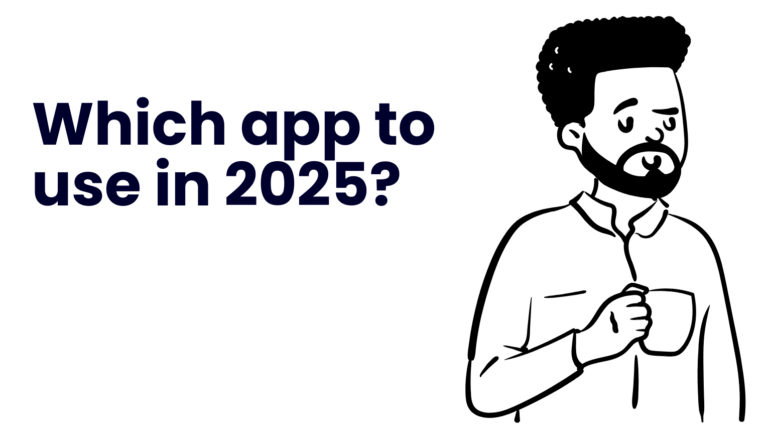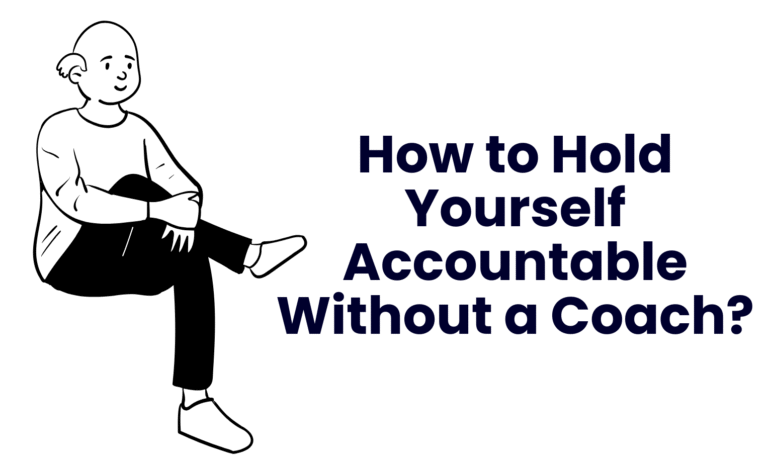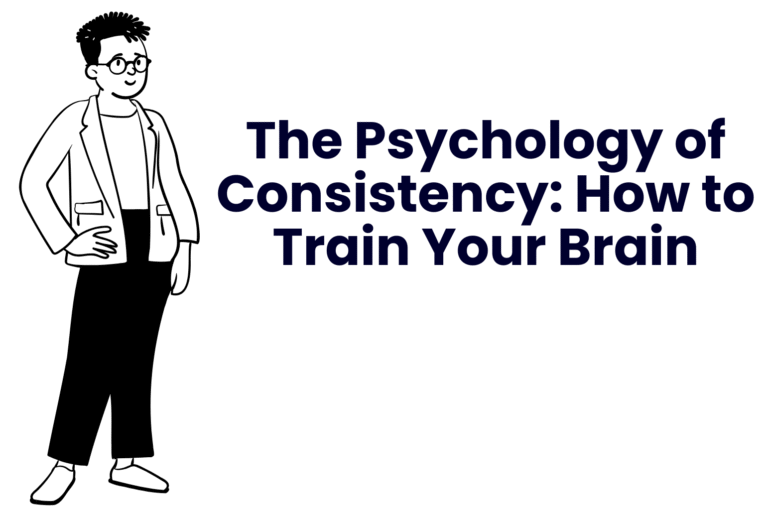Ultimate Guide to Accountability: How to Stay on Track with Any Goal
Ever wonder why some people achieve their goals while others quit halfway? The secret isn’t motivation—it’s accountability. Without it, even the best plans fail.
A few years ago, I set a goal to take cold shower at 6 AM every day. I was convinced it would change my life as I read about it in blogs and heared about it on podcasts. I wanted to be accountable for my health.
The first week of the habit? I was unstoppable. Every single day, I used to wake up and take cold shower. I also set alarms (multiple), a morning routine, and the discipline of a Navy SEAL (or so I thought).
By week three? Snooze button. I started giving stupid excuses like I haven’t slept enough etc etc.
I thought if I even wanted this goal in the first place. Was I just not consistent enough? Did I lack motivation to the task?
Turns out, my problem wasn’t discipline. It was the system I was using to stay consistent.
And that’s the real issue—most people think motivation will carry them through, but in reality, motivation fades. The key to achieving your goals isn’t willpower.
Research shows that 92% of people fail to achieve their New Year’s resolutions.
The problem?

The majority of us rely on motivation through instagram, tiktok or even youtube video is temporary while accountability helps people keep their word even when they don’t feel like it.
In this guide, you will learn what accountability is exactly, why it works, and how to create a bulletproof accountability system that makes quitting difficult.
What Is Accountability? (And Why It Works)
In its simplest form, accountability means being responsible for your actions. But it is more complex than just ‘checking in’ on your daily habits.
A study revealed that you are likely to achieve a goal if you announce it to someone else. This rises to 95% if you have scheduled weekly or monthly accountability checks on your goals. (Source)
A few years ago, I made a bold declaration to my friends: “I’m going to run a half marathon.” I had never been a runner. In fact, I hated running. But I figured if I told enough people, I’d have no choice but to follow through.
For the first few weeks, I was fueled by excitement. I bought new running shoes, mapped out my training plan, and even signed up for the race. But soon, the reality hit—early morning runs were brutal, my legs ached, and skipping a workout seemed way too easy.
Then something interesting happened. Every time I thought about quitting, I remembered all the people who knew about my goal. My friends would casually ask, “How’s the training going?” And I couldn’t bring myself to say, “I gave up.” That tiny fear of looking like a quitter kept me going.
Turns out, there’s a science behind this:
- Social Commitment Bias – When you announce your goals publicly, your chances of success jump by 65% (Dominican University). Why? Because no one wants to be seen as the person who backs out.
- The Hawthorne Effect – We perform better when we know we’re being watched. It’s why athletes train harder when coaches are present.
- Commitment Devices – If there’s something at stake—whether it’s your reputation, money, or pride—you’re more likely to stick to your goal.
In short: Motivation is unreliable. But accountability? That’s the real game-changer.
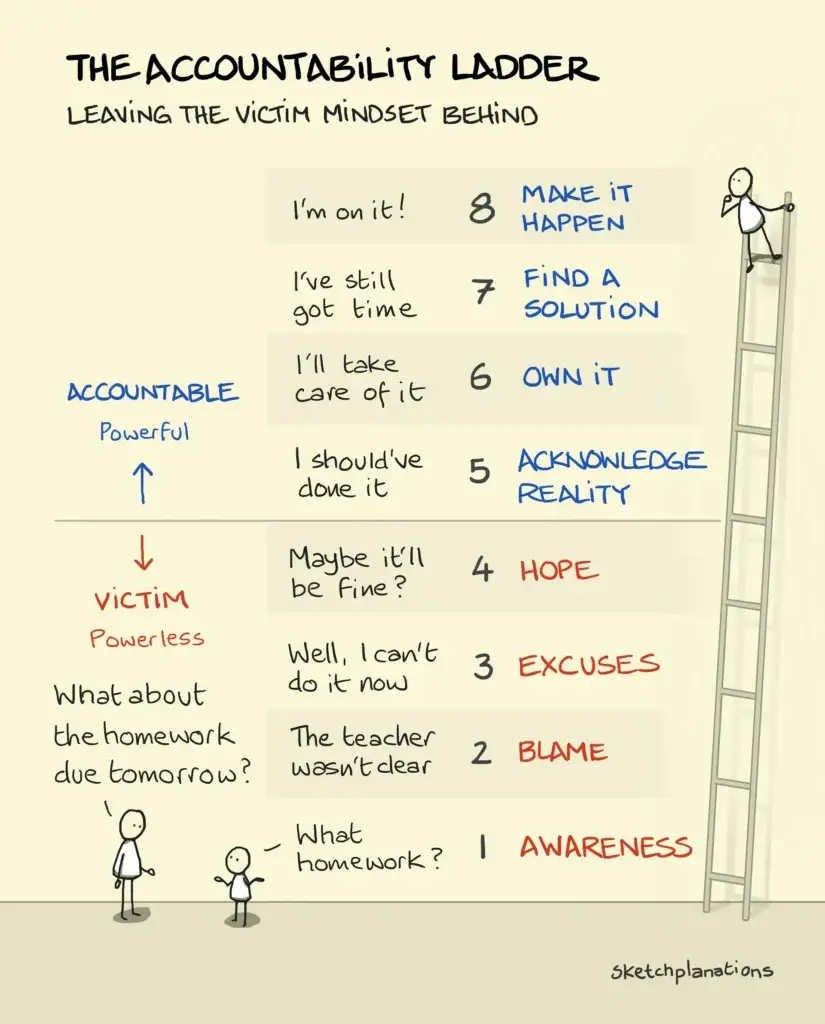
So if you’re struggling to follow through on a goal, don’t rely on motivation. Instead, build a system that makes quitting harder than succeeding.
3 Types of Accountability (Select One)
-
Self-Accountability
A few years ago, I did what most people do in January—I signed up for a gym membership, fully convinced this was the year I’d finally get in shape. No trainer, no workout partner, no accountability. Just me, my playlist, and my “commitment.”
For the first two weeks, I was on fire. Showing up every day, pushing myself, feeling unstoppable. But then, life happened. One skipped workout turned into two. Then a week. Then a month. And guess what? No one noticed.
That’s the thing about self-accountability—it sounds great in theory. You answer to yourself, and no one else. If you’re disciplined enough, it can be a powerful tool.
Pros of Self-Accountability:
- You’re in full control of your actions – No relying on others for pushing you.
- Builds mental discipline – You train yourself mentally to be responsible and drive yourself everyday.
- Pure independence – Your success around habits is entirely in your hands.
But here’s the problem:
Cons of Self-Accountability:
- No consequences for failure – If you fail you fail, no one tells you anything.
- Staying mentally tough is difficult – Trust me, it gets lonely atleast once a week. You need to be reminded of your goals frequently in order to stay on track
And that’s exactly what happened to me. There was zero consequence for skipping gym. No one was holding me to my goal, and before I knew it, I had completely fallen off track with my gym.

Self-accountability works best for highly disciplined people, but let’s be real—most of us aren’t built like that. That’s why, if you want to stay consistent in the long run, you need external accountability through motivated friends or coach.
How to Improve Self-Accountability:
So, you want to hold yourself accountable without relying on others? It’s possible but you just need the right system. Here’s how you can make self-accountability actually work:
1. Track Your Habits (A MUST)
Most people fail at self-accountability because they don’t track their progress daily or weekly. When you’re not keeping score, it’s easy to convince yourself that you’re “doing enough.” The fix? Using an online habit tracker.
- Mobile Apps like Accompli (perfect for habits or goal tracking)
- Notion or Google Sheets (a little more nerdy)
- A physical journal (if you prefer pen and paper and are OG notebook person)
When you track your habits daily, you remove the guesswork of whether you are progressing or not. If you missed three workouts this week, it’s right there in front of you—you can’t ignore it but look at your excuses.
2. Check In Daily, Review Weekly
Tracking isn’t enough if you’re not reviewing your progress. Every night before going to sleep, take 30 seconds to check what you completed. At the end of the week, ask yourself:
- What went well? Did I complete all my tasks?
- Where did I struggle and WHY?
- How can I improve tomorrow or next week?
A simple Sunday 30 min check-in can make difference for the entire week.
3. Keep a Habits Journal
Sometimes, the biggest challenge isn’t the habit itself—it’s your mindset.

Keeping a journal helps you recognize patterns in your behavior, understand what’s holding you back, what excuses are you giving and then adjust your plans accordingly.
Try this: Every night, write one sentence about what went well and one thing you struggled with. Over time, you’ll start noticing trends and you can make changes.
2. Peer Accountability (Accountability Partners & Groups)
I wanted to get into cycling. Atleast twice a week. I tried the whole “I’ll do it on my own” thing, but after a few weeks, my motivation disappeared.
Then, one of my friend also joined me. Suddenly, skipping cycling wasn’t an option because I knew he’d be calling and waiting for me at my doorstep. We had the same struggles some days but when he wanted to quit, I motivated him. We pushed each other through the week.
And guess what? I actually stuck with it for more days than usual.

That’s the power of peer or friend’s accountability. It’s always great to have someone to check in with that makes all the difference.
Why this works?
- External motivation is MUST– When you don’t feel like showing up, your partner can nag you and motivate you.
- Shared struggles = easier progress – You’re not alone, and that makes goals feel less overwhelming and more achievable.
- More fun – Let’s be honest, everything’s better when you’re not doing it alone :p
But it’s not perfect…
Why this doesn’t work?
- Finding a reliable partner is hard – Some people flake, lose interest, or aren’t as committed. You can do nothing about their priorities if they actually change.
- Scheduling conflicts – Life happens, and sometimes your accountability partner isn’t available when you need them. Time and schedule matching is real problem.
Either ways, if you still want to go ahead with above, this is
How to Make it Work:
- Finding the right person – Someone as serious as you are about the goal. Ask for WHY behind doing the goals. Ask for timelines and how important it is for them.
- Set clear check-in times – Weekly or daily updates help maintain consistency between you two.
- Join an accountability group – If one person isn’t reliable, a group increases your chances of staying on track. You may find local groups around cycling, running, etc. Why not start one?
3. Hiring a Coach or Partner
I tried to scale my marketing agency business on my own. I read books, watched podcasts, and tried every strategy I could find for getting clients. But no matter what I did, I hit a plateau with strategy.
That’s when I decided to invest in a business coach. It wasn’t cheap—every session felt like a serious investment—but the results?
Immediate.

Instead of second-guessing myself, I had clear direction of how to scale. Instead of making excuses, I had someone keeping me accountable for my weekly actions.
Why this works?
- Expert guidance helps – Coaches/Trainers provide personalized strategies that actually work in your industry.
- Serious commitment towards helping you – When you pay for accountability, you take it seriously. Money is serious motivator sometimes.
- Improved results – Saves alot of trial and error. Execution is main focus.
The Downsides:
- VERY Expensive – Top-tier coaches charge anywhere from $100 to $500 per hour. Even consultants charge from $250+ an hour.
- Not always sustainable – Long-term coaching can be financially draining. You will eventually have to work on self-discipline.
When is the right time to invest in a coach:
- You’ve tried multiple times to push yourself but keep failing.
- You want to lessen the learning curve and get results faster.
At the end of the day, a good coach isn’t just an investment in knowledge—it’s an investment in action.
If self-accountability and peer accountability haven’t worked, this might be the push you need.
How to Hold Yourself Accountable (Step-by-Step Guide)
- Set Clear Goals Using the SMART Framework.
Most people fail because their goals are too vague or big enough to get overwhelmed. Here’s an example –
Bad goal setting framework: I want to hit the gym to get fit.
SMART Goal setting framework: I will work out atleast 4x a week for 60 minutes for 21 days.
Why this approach is bound to work:
A specific, measurable, defined and timebound goal gives you clarity and a tracking system. We suggest our clients this framework on our intro calls. Keep the goal short and simple to achieve. Increase the milestones eventually.
2. Use an Accountability Partner or App
If you struggle with consistency, get an external accountability system. This could an app or person.
Accompli App helps you get a dedicated coach for less than $50/month who is dedicated to your goals and success.
3. Create External Consequences if you skip tasks (The Power of Social Accountability)
A friend of mine wanted to lose weight but kept skipping workouts. So, we made a bet—if he didn’t hit the gym four times a week, he had to pay ₹1,000 to a cause he absolutely hated. The first week, he barely made it. The second week, he started planning workouts in advance. By the third week, he wasn’t just showing up—he was enjoying it.
Lesson? When money on the line, it changes everything. When there’s a real consequence of losing money, laziness disappears.
How to Use Money-Based Bets for accountability:
- Set a financial penalty – If you miss your goal, donate a painful amount to friend or charity.
- Use apps like Beeminder or StickK – These platforms automate the process of donating.
- Make the donation hurt – Choose a cause you wouldn’t want to support.
4. Implement a Review System (Weekly Progress Reviews with yourself)
Most people fail because they don’t track efforts or habits.
How would you know if you don’t track what’s happening.
Any efforts that you make towards your goal must be counted or tracked. This gives you sense of accomplishment as well if you make effort and inspires you to do better.
You can track this progress weekly, monthly or even daily.

✅ How to Review your progress weekly:
- Ask yourself:
- What worked in this week?
- What didn’t?
- What can be improved?
- What were the causes of failure or my excuses?
- Adjust goals if needed – Don’t be afraid to tweak daily tasks or milestones. Avoid changing the goal entirely unless required.
Common Mistakes That Kill Accountability (And How to Fix Them)
1. Overemphasizing on Motivation
A lot of people think they need to be motivated in order to act. Motivation is a funny thing: it’s present one day and gone the next day, and it’s rarely around when you most need it. This is why people do well in first week or month but then lose their motivation after a few weeks or months.
Solution – Instead of waiting for motivation, establish structures that will compel you to act without having to think about it. Set your phone to alert you, schedule events and tasks and track daily habits that will not require willpower. For instance, if you have a problem with missing the gym, it is better to set an alarm for right after work or make an appointment for the gym. Get a friend at gym who calls you in the morning.
2. Setting Unachievable Goals
Most people fail at accountability because they set very high goals at the beginning. If you have never been a runner, trying to run 10km every day will only result in disappointment and exhaustion.

Solution – The first step is to make small changes and then progress from there. If you want to work out more often, try doing 10 minutes of work out instead of an hour. It is easier to stick to a goal when you are able to achieve small wins along the way.
3. No Consequence for Failure
When there is no real penalty for quitting, it can be easy to slip back into the old ways. If there are no repercussions for missing a workout or turning in a paper late, then there is no reason to stick to the plan.
Solution – Create real accountability stakes – Revise external consequences like financial penalties (e.g., putting your money on your goal), a public commitment, or an accountability partner who checks in on your progress. It will stay consistent knowing that failure has a cost.
Avoid these mistakes and use these fixes instead to build a strong accountability system that will keep you on track, no matter how slim your motivation gets.
If you’re tired of setting goals and not following through, it’s time to create a real accountability system for your dreams.
Action Steps for you:
Based on your current goals, have you –
✅ Set a SMART goal.
✅ Choose an accountability partner or app.
✅ Create external consequences.
✅ Track progress daily/weekly.
Ready to crush your goals?
Try Accompli App today—it’s free and built for go getters!

